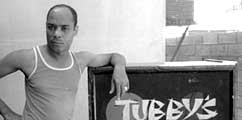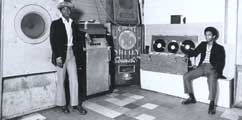The only way to listen to
reggae is at a sound system. Ideally, this would be at an open
air lawn in downtown Kingston, where it’s 80 degrees at 2am
and the bassline vibrates your bottle of Red Stripe, but a
church hall in Bristol or a house party in Birmingham will do.
The whole point is you’re packed in with like-minded people;
you have ownership of the music; the rig is such that you feel
it before you hear it; the deejay is vibing up the crowd; and
every killer tune brings a noisy reaction.
Sound
systems took over from orchestras in Jamaican dancehalls in
the 1950s – why pay a band when you can play imported US
R&B records? The cost of having your own record player or
radio was also overcome by the systems putting their speakers
in the street for all to hear the music. The first Jamaican
record producers - Prince Buster, Coxsone Dodd (Studio One)
and Duke Reid - were sound system owners, commissioning
recording sessions to ensure a supply of exclusive tunes.
Because sound system dances were one of the few things
ghetto people could call their own, they became central to
downtown life, thus a barmometer of popular taste. Once
producers started making records for sale, they’d test new
styles out on their sound system and nearly every development
in Jamaican music – ska, rock steady, reggae, dancehall and so
on has been a result of competition between sound men to find
something new to pull in the crowds.
Competition for
the best equipment and the most exciting music was fierce and
sound clashes – contests whereby two sound systems in the same
dance played alternate records and were judged by audience
reaction - frequently spilled over into violence. Clashes are
still part of reggae culture, dub plates get cut with the DJ’s
name being overlaid on the track. In London recently the DJ
David Rodigan had Wyclef Jean and Tom Jones (!) singing his
name live as part of the clash.
Wherever Jamaicans
have travelled sound systems have been part of their luggage.
In Great Britain sound systems established themselves almost
as soon as The Windrush docked. They are also at the centre of
the Notting Hill Carnival and proved crucial to development of
UK urban music as outfits like Soul II Soul in London and The
Wild Bunch in Bristol began life as local sound systems. In
New York, hip hop grew out of a sound system set up by an
ex-pat Jamaican - DJ Kool Herc – as he brought Kingston
dancehall culture to American music.
|

